
Section Branding
Header Content
Daughters Of MLK, Gov. Wallace, Unite For 50-year March
Primary Content

The daughters of two major figures of the civil rights era, Martin Luther King Jr. and former Alabama Gov. George Wallace, shared a stage on the steps of the Alabama Capitol on Wednesday to mark the 50th anniversary of the 1965 Selma-to-Montgomery voting rights march.
While their famous fathers were on opposite sides of history 50 years ago, the two came together to mark the milestone anniversary.
Bernice King stood near where her father stood in 1965 to read the "How Long, Not Long" address he gave civil rights marchers on March 25, 1965.
"Today, I stand where he could not stand, to synthesize our past with our present and speak those same words that he spoke," she told the crowd.
In an interview, Bernice King said the commemoration was a reminder of her father's "prophetic" words. She said the words he spoke to the crowd at the steps 50 years ago are still relevant.
"I think it's important going forward that we really grab hold to and embrace my father's nonviolent philosophy and methodology. That's the way forward for any social change issue in this country," Bernice King said in an interview.
Peggy Wallace Kennedy acknowledged her father's place on the wrong side of history, but that he eventually found "a redemption and understanding of the injustice and suffering of inequality" after he was paralyzed by a would-be assassin's bullet. Wallace, the former governor, was a segregationist who opposed civil rights in the 1960s but later apologized.
"On that day my father could not have known that he was already traveling on his own personal road to Jericho," Kennedy said.
The voting rights march commemoration came on the same day that the U.S. Supreme Court ruled in a challenge to Alabama legislative districts brought by black lawmakers. Justices said a lower court must take another look at whether Alabama's Republican-led legislature relied too heavily on race when it redrew the state's voting districts.
Black lawmakers argued the plan packed black voters into majority-black districts and limited their ability to influence elections outside those districts.
Thousands gathered outside the Alabama Capitol for the final event in a nearly monthlong commemoration. Hundreds retraced the final leg of the 1965 march to the Alabama Capitol. The crowd ranged in age from children being pushed in strollers to people who marched in 1965. The route wound through the city's historic neighborhoods, including near the spot where Rosa Parks lived and the barbershop where King got his hair cut.
One of the modern-day marchers was Rosetta Ferguson Moncrief, who was a teenager in 1965. Moncrief remembered her family had invited a white preacher from the north to stay the night with them because hotels wouldn't give white participants a room. Moncrief said she doesn't remember his name but remembered her mother serving him grits - a southern staple that the preacher had never tried.
"So of course we laughed about that and talked about it, and he did eat the grits. He knew that he was playing an important role at that time in the movement. Those whites who sacrificed their lives to come here to help people that they had never seen before in their lives. That was the beauty of that march."
In 1965, Wallace did not meet with marchers, but watched from his Capitol office window. In 2015, Alabama Gov. Robert Bentley welcomed the predominantly black crowd and acknowledged the state has changed.
"Alabama made history for all the wrong reasons, but today Alabama is different," Bentley told the crowd.
"Today is a vivid reminder of how far we have come as a state and as a nation. It is also a reminder of what happens when you never give up."
Montgomery, a city with a previously shadowed civil rights history, is now capitalizing on its past by turning the anniversary into a tourism event.
Montgomery Mayor Todd Strange described the city as a work in progress. The city of 200,000 has a population that is 56 percent black and 37 percent white.
"We've built a strong bridge, but we have more of that bridge to build," Todd Strange said.
"We want to continue to build those planks so we can be that beloved community that Martin Luther King talked about. I don't know how you would define it, but you know it when you see it. We're getting there, but we're certainly not there yet," he said.
Walking several rows behind Strange was Idong Mkpong-Ruffin, a Nigerian immigrant who has lived the past 16 years in Montgomery. She said she brought her son along so that he could experience history.
"It gives us hope that in spite of a lot of atrocities, if people come together a lot can be done," she said.
Tags: Martin Luther King Jr., former Alabama governor George Wallace, Bernice King, Peggy Wallace Kennedy, 50th anniversary of the Selma-to-Montgomery voting rights march
